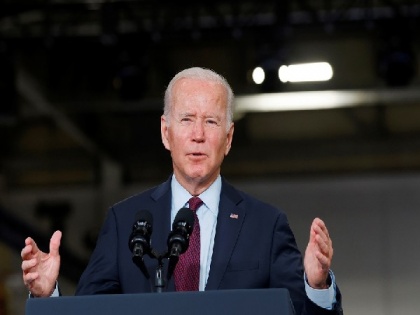Is Biden's new Interest Europe and Indo-Pacific?
By ANI | Published: January 8, 2022 08:38 AM2022-01-08T08:38:45+5:302022-01-08T08:45:02+5:30
The strategic orientation of US foreign policy has shifted dramatically under the Joe Biden Administration and it appears that now the Greater Middle East Region is a minor area of interest and, Europe and the Indo-Pacific Region (IPR) are more important for the United States, according to an analysis.

Is Biden's new Interest Europe and Indo-Pacific?
The strategic orientation of US foreign policy has shifted dramatically under the Joe Biden Administration and it appears that now the Greater Middle East Region is a minor area of interest and, Europe and the Indo-Pacific Region (IPR) are more important for the United States, according to an analysis.
After the US left Afghanistan, now it is ready to confront both the Chinese and the Russians with credible and powerful forces in order to dissuade them from endangering US interests in one or both regions, writes Imran Malik in The Nation, a leading daily newspaper based in Lahore, Pakistan.
In addition, the United States will spend in developing and strengthening infrastructure in the affected areas in order to assist future operations, reported The Nation.
NATO appears to be advancing dangerously near to Russia's borders, calling Russia's regional policy and assertiveness into doubt. NATO is particularly concerned about a possible Russian invasion of Ukraine, which appears to be within the Russians' perceived security perimeter/zone.
No former Soviet republic should be admitted to NATO, and no offensive weapon systems should be stationed on its borders, according to the Russians. Presidents Biden and Putin are both concerned about the situation and have already spoken about it. More talks are planned, reported The Nation.
The US regards China as a "pacing challenge" in the Indo-Pacific Region (IPR), and is particularly enraged by its presence and assertiveness in the East and South China Seas/IPR.
India, a strategic ally of the United States and a member of the Quad, is thus unavoidably drawn into this raging cold war.
The United States will not be hesitant to set it against China and, inevitably, Pakistan (strategy of Offshore Balancing). In a two-pronged strategy, the US and its allies could try to block China in the Malacca Straits/IPR, while India is tasked with delaying, disrupting, and/or destroying China's Belt and Road Initiative (BRI) and particularly China-Pakistan Economic Corridor (CPEC), reported The Nation.
BRI-CPEC provides China with an alternate, but vital, route to the Arabian Sea/Indian Ocean Region. By seriously upending the BRI-time CPEC's and space matrix, a critical blow might be delivered. India will be successful.
The US maintains a forward-leaning posture and the pre-positioning of soldiers, logistics, weapons, ammunition, and equipment in both potential theatres of battle in order to discourage and defeat attack if needed.
( With inputs from ANI )
Disclaimer: This post has been auto-published from an agency feed without any modifications to the text and has not been reviewed by an editor
Open in app